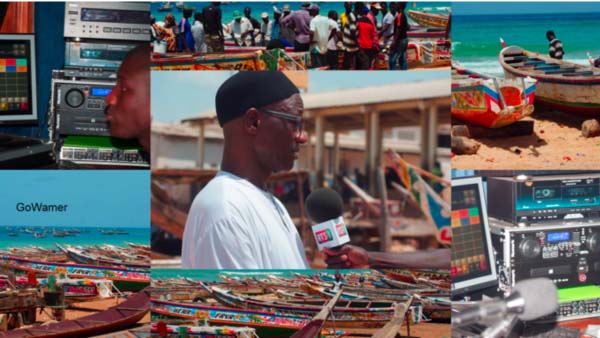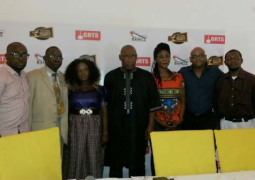
Journalists and communication officers from seven (7) sub-regional fisheries member countries at the weekend commenced a four-day visit of World Wide Fund for nature (WWF) project intervention sites, a program organized and financed WWF through European Union (EU) and United Nations Development Programme (UNDP support.
The first project site visited on Saturday 27th September include a Cayar Community Radio 89.1 FM, Aire Marine Protege de Cayar, fisheries department and other fish landing all in the region of Thies.
Briefing journalists, Mr Taib Diof head of the delegation, said the purpose of the visit was to let media practitioners the opportunity to get first-hand information and see for themselves how the project impacted on the lives of local communities, thus promote the achievements of Go-Wamer project “Governance, policy management of marine and coastal resources, poverty reduction and food security in the ecoregion WAMER”.
According to him, the project has a life span of four years with a grand funding of ten and half million Euros (E10.5) funding from EU and UNDP for the member countries, namely Cape Verde, The Gambia, Guinea Conakry, Guinea- Bissau, Mauritania, Sierra Leone and Senegal.
“The principal objective is to improve governance and promote adoption of best practices for sustainable use of marine and coastal resources in WAMER, thus contribute to poverty reduction and realization of food security,” Diof added.
The first place visited on day one was the Cayar community radio, which has a coverage radius of 52 km and is mainly run by the community of Cayar according to Babacar Mbaye Balde director of the radio at a short meeting held at the radio campus.
According to him, the radio has twenty volunteers who are working daily supported by WWF project and community contribution to maintain the volunteers once the project phases out. He also said the main radio programs include marine resources conservation, for example fish, sanitation and hygienic, agriculture and health promotion programs.
Mbaye NIANG, representative of Cayar mayor, spoke on the importance of information sharing, which the radio is providing for the community and its catchment areas especially issues regarding the such as when to fish or best time of fishing and how to fish for sustainability purposes.
He commended WWF for the initiative and assured them of government’s collaboration and partnership in supporting the cause of local people.
For her part, Madam Adja Oulaye SALL, president of the Cayar FM committee, spoke at length on the importance of information, adding that information is food and is development.
“If people are well informed they can make informed choices that can improve their lives,” she stated, adding that the radio was built to the tune of seventy million CFA (CFA 70 million) and the project was supporting the running of the radios before it phased out, noting that plans are in place to sustain the radio in the absence e of project.
The next place visited was fisheries department and according to the head of the department, Mr Moussa Mbengue the WWF project had made their work easier by providing fuel to patrol and monitor the sea to ensure things are done accordingly by the local communities.
According to Mr Mbengue, the department is tasked with responsibility of coordinating and manage all activities and interventions in and within the coast and promote best practices in harvesting the resources for sustainability purpose.


